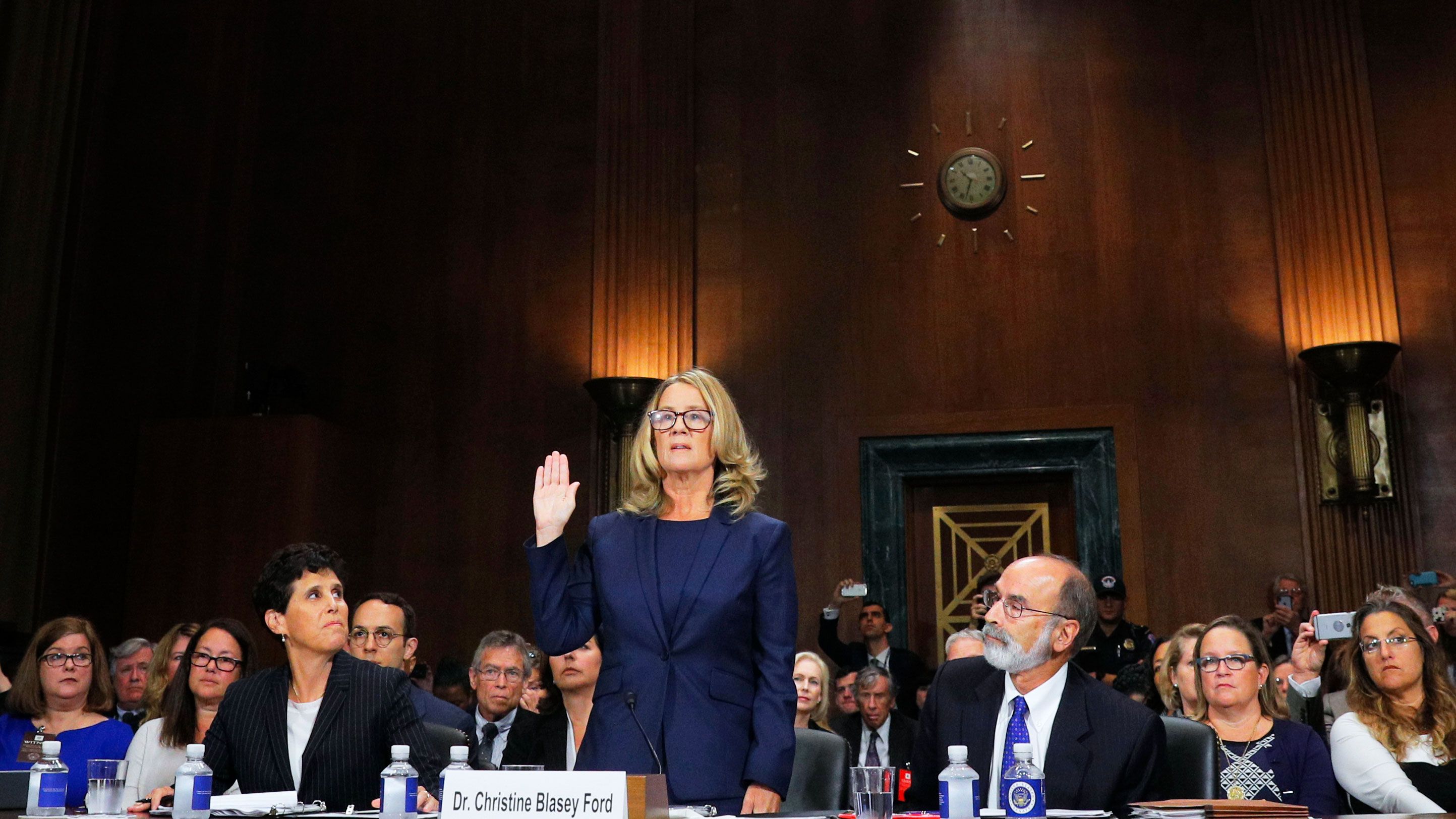The Christine Blasey Ford Quote That Will Stay With You
It reflected both her background in psychology and her trauma.


Surrounded by men who have gone on the record to say they don't believe her, Christine Blasey Ford painstakingly recounted for the Senate Judiciary Committee an experience from 1982 that, Dr. Ford says, compelled her to come forward. "I am terrified," she admitted frankly, surrounded by cameras and flanked by lawyers. Telling her story, she noted: "Indelible in the hippocampus is the laughter." Her voice cracked.
Dr. Ford had been asked about her most vivid memory of what she claims was a sexual assault at the hands of almost-Supreme Court justice Brett Kavanaugh, which the judge denies. (It's worth mentioning here that forcing a survivor to relive their experience can be detrimental to their mental health, even in a supervised psychiatric setting.) Bracing herself, Dr. Ford responded: "The laughter."
Patrick Leahy, the Democrat asking Dr. Ford questions at the time, asked her to elaborate. "Indelible in the hippocampus is the laughter," Dr. Ford said. “The uproarious laughter between the two. They’re having fun at my expense."
Dr. Ford added: “They were laughing with each other...I was underneath one of them, while the two laughed...Two friends having a really good time with one another.”
Perhaps Dr. Ford's observation is so potent because she is a renowned professor in psychology. Her observation about the hippocampus isn't pulled from thin air—it's a topic she knows intimately. (The hippocampus, for the record, is whether memory and emotion are thought to be stored.)
RELATED STORY

Dr. Ford went on to describe how trauma fixes itself to that part of the brain for the Senate Judiciary Committee: "Trauma-related experience is locked there...Other memories just drift," she said.
Dr. Ford has many other memories of the experience, she said—but this one, this in particular, stayed with her. It speaks to the shame that many survivors feel—shame imposed on them by socialized victim-blaming, by their own trauma, by a system that routinely fails them. It speaks to the humiliation of not just being violated on the most basic level, but feeling degraded in every way—psychologically, emotionally, spiritually. Even with her vast experience in the field of psychology, even with all she knows about how the brain processes trauma, Dr. Ford's visible emotion reveals that there is no overcoming that "indelible" feeling, regardless of how much time has passed.
Stay In The Know
Get exclusive access to fashion and beauty trends, hot-off-the-press celebrity news, and more.
"Indelible in the hippocampus is the laughter. The uproarious laughter between the two and their having fun at my expense." Leahy: "You've never forgotten that laughter?"Dr. Ford shakes her head. (via ABC) pic.twitter.com/lUp9cS0QH6September 27, 2018
Watching the hearing, people everywhere—survivors and otherwise—were left heartbroken by her brave and unforgettable testimony. Dr. Ford has been described as a patriot, an American hero, and capable of things that are beyond most people.
Yet, even if her testimony is what fells Kavanaugh and stops him from taking a seat on the highest court in the land, Dr. Ford had to re-traumatize herself in front of the entire nation to do so. Once again, a women's pain is being utilized in a way that does not benefit her, and—as is viscerally obvious watching the testimony—is actively, terribly, painful.
RELATED STORY


Jenny is the Digital Director at Marie Claire. A graduate of Leeds University, and a native of London, she moved to New York in 2012 to attend the Columbia University Graduate School of Journalism. She was the first intern at Bustle when it launched in 2013 and spent five years building out its news and politics department. In 2018 she joined Marie Claire, where she held the roles of Deputy Digital Editor and Director of Content Strategy before becoming Digital Director. Working closely with Marie Claire's exceptional editorial, audience, commercial, and e-commerce teams, Jenny oversees the brand's digital arm, with an emphasis on driving readership. When she isn't editing or knee-deep in Google Analytics, you can find Jenny writing about television, celebrities, her lifelong hate of umbrellas, or (most likely) her dog, Captain. In her spare time, she writes fiction: her first novel, the thriller EVERYONE WHO CAN FORGIVE ME IS DEAD, was published with Minotaur Books (UK) and Little, Brown (US) in February 2024 and became a USA Today bestseller. She has also written extensively about developmental coordination disorder, or dyspraxia, which she was diagnosed with when she was nine.
-
 Tyla's Coachella Outfit Pairs Dolce & Gabbana With Pandora
Tyla's Coachella Outfit Pairs Dolce & Gabbana With PandoraThe singer wore a gold version of the crystal bra made famous by Aaliyah.
By Amy Mackelden Published
-
 How Kate Middleton Is Influencing George's Fashion Choices
How Kate Middleton Is Influencing George's Fashion ChoicesThe future king's smart blazer is straight out of Princess Kate's style playbook.
By Amy Mackelden Published
-
 King Charles "Couldn't" Meet Prince Harry During U.K. Visit
King Charles "Couldn't" Meet Prince Harry During U.K. Visit"It could actually bring down a court case."
By Amy Mackelden Published
-
 36 Ways Women Still Aren't Equal to Men
36 Ways Women Still Aren't Equal to MenFeatures It's just one of the many ways women still aren't equal to men.
By Brooke Knappenberger Last updated
-
 How New York's First Female Governor Plans to Fight for Women If Reelected
How New York's First Female Governor Plans to Fight for Women If ReelectedKathy Hochul twice came to power because men resigned amid sexual harassment scandals. Here, how she's leading differently.
By Emily Tisch Sussman Last updated
-
 Why the 2022 Midterm Elections Are So Critical
Why the 2022 Midterm Elections Are So CriticalAs we blaze through a highly charged midterm election season, Swing Left Executive Director Yasmin Radjy highlights rising stars who are fighting for women’s rights.
By Tanya Benedicto Klich Published
-
 Tammy Duckworth: 'I’m Mad as Hell' About the Lack of Federal Action on Gun Safety
Tammy Duckworth: 'I’m Mad as Hell' About the Lack of Federal Action on Gun SafetyThe Illinois Senator won't let the memory of the Highland Park shooting just fade away.
By Sen. Tammy Duckworth Published
-
 Roe Is Gone. We Have to Keep Fighting.
Roe Is Gone. We Have to Keep Fighting.How To Democracy always offers a path forward even when we feel thrust into the past.
By Beth Silvers and Sarah Stewart Holland, hosts of Pantsuit Politics Podcast Published
-
 The Supreme Court's Mississippi Abortion Rights Case: What to Know
The Supreme Court's Mississippi Abortion Rights Case: What to KnowThe case could threaten Roe v. Wade.
By Megan DiTrolio Published
-
 Sex Trafficking Victims Are Being Punished. A New Law Could Change That.
Sex Trafficking Victims Are Being Punished. A New Law Could Change That.Victims of sexual abuse are quietly criminalized. Sara's Law protects kids that fight back.
By Dr. Devin J. Buckley and Erin Regan Published
-
 My Family and I Live in Navajo Nation. We Don't Have Access to Clean Running Water
My Family and I Live in Navajo Nation. We Don't Have Access to Clean Running Water"They say that the United States is one of the wealthiest countries in the world. Why are citizens still living with no access to clean water?"
By Amanda L. As Told To Rachel Epstein Published